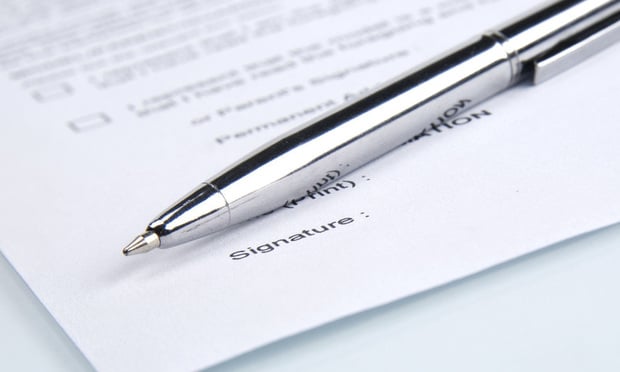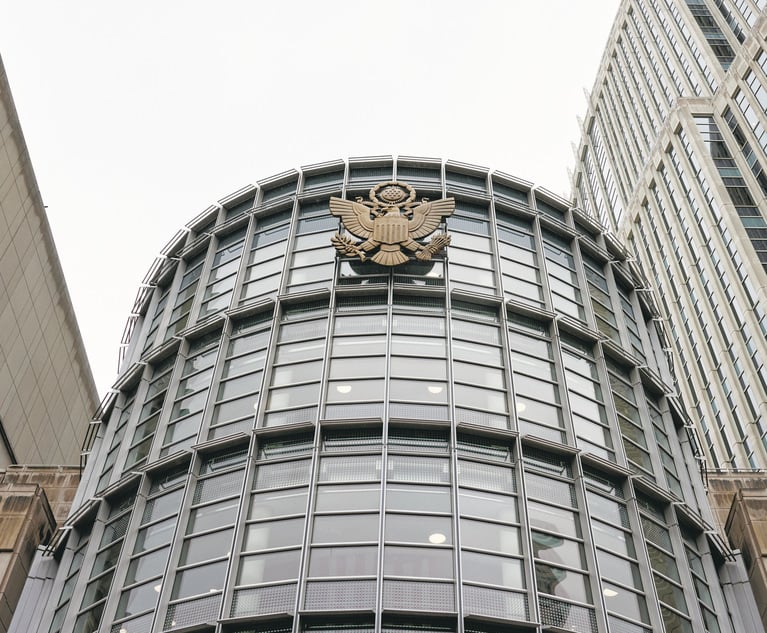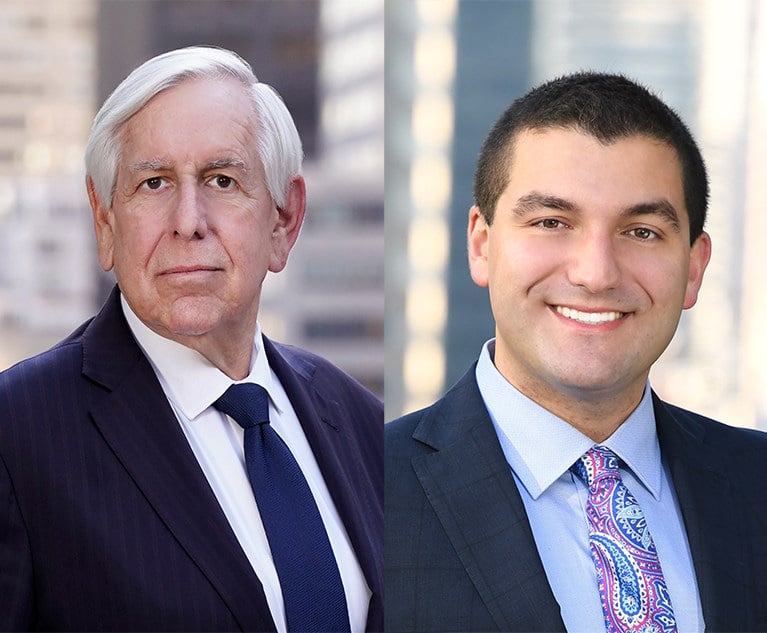Contractual Nonperformance in the Wake of COVID-19
Like other major disasters, the litigation that will ensue will be monumental, and the wars between tenants and landlords are already underway.
April 01, 2020 at 11:15 AM
10 minute read
 On March 12, 2020, the World Health Organization (WHO) classified the outbreak of the coronavirus, generally referred to as COVID-19, as a pandemic. The virus, which emerged from a seafood and poultry market in Wuhan, China, was first reported in December 2019. Since its discovery, the contagion has quickly spread throughout the world like a wildfire, killing roughly 38,000 people in its path. According to the most recent report from the U.S. National Institute of Allergy and Infectious Diseases, over 200,000 Americans may be killed by the virus with millions being infected. In addition to the major human death toll, COVID-19 has crippled economies around the globe, as world leaders have enacted strictly mandated lockdowns in an effort to slow down its transmission.
On March 12, 2020, the World Health Organization (WHO) classified the outbreak of the coronavirus, generally referred to as COVID-19, as a pandemic. The virus, which emerged from a seafood and poultry market in Wuhan, China, was first reported in December 2019. Since its discovery, the contagion has quickly spread throughout the world like a wildfire, killing roughly 38,000 people in its path. According to the most recent report from the U.S. National Institute of Allergy and Infectious Diseases, over 200,000 Americans may be killed by the virus with millions being infected. In addition to the major human death toll, COVID-19 has crippled economies around the globe, as world leaders have enacted strictly mandated lockdowns in an effort to slow down its transmission.
Economic Global Catastrophe
The state of New York has been deemed the epicenter of the coronavirus in the United States. To halt the further dissemination of the virus within New York State, Gov. Andrew M. Cuomo adopted several Executive Orders closing courthouses, public schools and most businesses, mandating social distancing, and banning "non-essential" travel. Only a few "essential" businesses are allowed to continue their operations during the government shut down, such as grocery stores and pharmacies.
These business closures have been enacted by many other states causing widespread job losses across all sectors, including the legal field, deterioration of the health care system, and capitulation of the stock market. Many economic experts have opined that the fallout will plunge the country into a recession. To counterbalance this economic catastrophe, on Friday, March 27, 2020, the Federal Government passed the Coronavirus Aid, Relief and Economic Security Act (CARES), consisting of $2 trillion in emergency relief funding for businesses, public institutions, and individuals.
It was a century ago that the world witnessed its last pandemic, the influenza of 1918 (the 1918 Flu), often inaccurately described as the "Spanish Flu," in which more people died than in World War I. Similar to the 1918 Flu, COVID-19 has crushed New York City, the world's premier financial center, with strangely similar lockdowns being instilled. Many experts believe that longstanding New York City businesses will never reopen following the government shutdown, especially those with physical buildings and facilities that are unable to operate remotely, including the City's mom and pop restaurants, and that parties will try to wriggle out of their commercial contracts, with an overloading of bankruptcies on the horizon.
Future COVID-19 Force Majeure Cases
There are already a large number of businesses, particularly commercial tenants, who are exploring workout options, rental deferments, as well as outright lease rescission or full rental abatements from landlords. Some of the larger publicly traded companies and national chains that have the financial wherewithal may be able to weather the storm, but the smaller businesses could very well be doomed if they are unable to renegotiate their leases. The tenants that are unable to renegotiate better terms with their landlords will invariably seek court intervention to excuse their rental obligations, as a result of the government closures caused by COVID-19. These litigations will be waged in courts as soon as they reopen, and barring interjection from the legislature, they will be determined based upon the plain language and meaning of the contracts.
The Language of the Contract Rules. New York law is crystal clear that "when parties set down their agreement in a clear, complete document, their writing should as a rule be enforced according to its terms"; these "considerations are all the more compelling in the context of real property transactions, where commercial certainty is a paramount concern, and where … the instrument was negotiated between sophisticated counseled business people negotiating at arms length" W.W.W. Associates v. Gianconteri, 77 N.Y.2d 157 (1990); see also Vermont Teddy Bear Co. v. 538 Madison Realty Co., 1 N.Y.3d 470 (2004). Accordingly, contracts are interpreted according to their plain and natural meaning. Mercury Bay Boating Club v. San Diego Yacht Club, 76 N.Y.2d 256 (1990).
Moreover, as the Court of Appeals recently held in 159 MP Corp. v. Redbridge Bedford, 33 N.Y.3d 353 (2019), "[i]n keeping with New York's status as the preeminent commercial center in the United States, if not the world, our courts have long deemed the enforcement of commercial contracts according to the terms adopted by the parties to be a pillar of the common law." Thus, unless the contract was entered into under duress, involves illegal activity or is contrary to public policy, "[f]reedom of contract prevails in an arm's length transaction between sophisticated parties …, and in the absence of countervailing public policy concerns there is no reason to relieve them of the consequences of their bargain" (quoting Oppenheimer & Co. v. Oppenheim, Appel, Dixon & Co., 86 N.Y.2d 685 (1995)).
Does COVID-19 Qualify as an 'Act of God' To Suspend Performance of Contractual Obligations in the Commercial Context? Generally, an "act of God" reference is found in a contract's force majeure provision and, if triggered, allows for suspension of the contract, or, even outright termination. Under New York law, acts of God are defined as events that occur without any aid or interference of humankind and which cannot be "avoided by human prudence and foresight." Merrit v. Earle, 29 N.Y. 115 (1864); Michaels v. New York Cent. R. Co., 30 N.Y. 564 (1864); see also Read v. Spaulding, 30 N.Y. 630 (1864); Barnet v. New York Cent. & H.R.R. Co., 222 N.Y. 195 (1918). New York jurisprudence is also well-settled in that force majeure provisions are narrowly construed and only excuse nonperformance where "the force majeure clause specifically includes the event that actually prevents a party's performance." Kel Kim v. Cent. Mkts., 70 N.Y.2d 900 (1987); see also 407 East 61st Garage v. Savoy Fifth Ave., 23 N.Y.2d 275 (1968); United Equities Company v. First National City Bank, 395 N.Y.S.2d 640 (1977).
Some examples of force majeure events enumerated in commercial contracts are: (1) pandemics; (2) quarantines; (3) national emergencies; (4) acts of God; (5) governmental orders; (6) floods; (7) earthquakes; and (8) hurricanes. Therefore, where a parties' force majeure clause explicitly defines a specific event such as a "pandemic," "quarantine," "national emergency," or "governmental order," it will in all likelihood excuse performance as a consequence of the recent COVID-19 outbreak. This is because WHO previously declared COVID-19 a "pandemic," we are in the midst of not only a "national emergency," but a global one, and the governor has issued decrees to "quarantine" the entire New York population to contain the virus. Conversely, there are leases that provide that the rent will not abate even in the event of a force majeure event such as a pandemic, and in those instances, the parties will probably be held to the benefit of the bargain, meaning that the tenant will not be entitled to any abatement. Notwithstanding, tenants will predictably argue that because of the government's social distancing rules and bars against non-essential travel, their commercial spaces are unable to be accessed, thus negating their rental obligations.
Traditionally, "acts of God" cover natural disasters like Hurricane Katrina and Superstorm Sandy, as opposed to pandemics. For those contracts that fail to specify the events clearly triggering force majeure for COVID-19, but which instead merely refer to an "act of God," it will be interesting to see whether courts expand the definition of "act of God" to cover COVID-19 scenarios. Given the colossal economic destruction caused by the disease, it would be hard to imagine the courts not extending the definition of an act of God to COVID-19 force majeure claims. If courts do ultimately expand the "act of God" definition to cover COVID-19, it will be universally applied as a defense against breaches based upon nonperformance, and will also widely be used to renegotiate commercial contracts in COVID-19's aftermath.
The Doctrines of Impossibility and Frustration of Purpose. Even, assuming, arguendo, that courts hold that COVID-19 does not equate to an "act of God," litigants may still rely upon the common law doctrines of impossibility or frustration of purpose to circumvent their contractual obligations. Nitro Powder Co. v. Agency of Canadian Car & Foundry Co., 233 N.Y. 294 (1922); Mawhinney v. Millbrook Woolen Mills, 231 N.Y. 290 (1922); see also 14 Corbin on Contracts §76.5. According to the law of impossibility, "performance of a contract will be excused if such performance is rendered impossible by intervening governmental activities, but only if those activities are unforeseeable." Kel Kim, 70 N.Y.2d at 902.
Specifically, a party seeking to rescind a contract must show that the intervening act was unforeseeable, even if the intervening act consisted of the actions of a governmental entity or the passage of new legislation. Nash v. Board of Ed., Union Free School Dist. No. 13, Town of Islip, 38 N.Y.2d 686 (1976); see also 10 NY Jur, Contracts, §373. Under this rubric, litigants will argue that the governor's orders restricting non-essential travel and shutting down most businesses certainly qualifies as an unforeseeable event at the time of execution of the contract between the parties, as certainly no one could have possibly foreseen this pandemic, hence rendering contractual performance impossible. Courts may also take a liberal view under this doctrine when evaluating impossibility flowing from COVID-19 closures.
The frustration of purpose doctrine is an extremely narrow one, which is used as a defensive measure in breach of contract cases and is inapplicable "unless the frustration is substantial." Farlou Realty Corporation v. Woodsam Associates, 294 N.Y. 846 (1945). In order to invoke this doctrine, the frustrated purpose must be so completely the basis of the contract that, as both parties understood, without it, the transaction would have made little sense. See Restatement (Second) of Contracts, §265 (1981). Since the present governmental closures appear to be temporary in nature, and the ultimate purpose upon which contracts are based, will conceivably be restored once the government lifts the bans on travel, the virus is eradicated and businesses resume their operations, invoking this doctrine in the COVID-19 context will probably have a remote chance of success.
Conclusion
Although COVID-19 is still nascent, only having just recently landed on our shores, the destruction that it has caused to human life and our economy is unprecedented. Like other major disasters, the litigation that will ensue will be monumental, and the wars between tenants and landlords are already underway. Throughout our history, catastrophic events have led to litigation which has ultimately helped shaped new laws and legal doctrines as will COVID-19. In the event that legislature does not step in to define force majeure or "acts of God," for purposes of nonperformance of commercial contracts under COVID-19, then the courts will be making these determinations within the framework discussed herein.
Massimo F. D'Angelo is a partner at Adam Leitman Bailey, P.C.
This content has been archived. It is available through our partners, LexisNexis® and Bloomberg Law.
To view this content, please continue to their sites.
Not a Lexis Subscriber?
Subscribe Now
Not a Bloomberg Law Subscriber?
Subscribe Now
NOT FOR REPRINT
© 2025 ALM Global, LLC, All Rights Reserved. Request academic re-use from www.copyright.com. All other uses, submit a request to [email protected]. For more information visit Asset & Logo Licensing.
You Might Like
View All
Disbarred NY Atty Receives 54-Month Prison Sentence After $3M Embezzlement
3 minute read
Unit Owners Sued Board for Failure To Maintain Adequate Fire Insurance: This Week in Scott Mollen’s Realty Law Digest


Law Firms Mentioned
Trending Stories
- 1'Translate Across Disciplines': Paul Hastings’ New Tech Transactions Leader
- 2Milbank’s Revenue and Profits Surge Following Demand Increases Across the Board
- 3Fourth Quarter Growth in Demand and Worked Rates Coincided with Countercyclical Dip, New Report Indicates
- 4Public Notices/Calendars
- 5Monday Newspaper
Who Got The Work
J. Brugh Lower of Gibbons has entered an appearance for industrial equipment supplier Devco Corporation in a pending trademark infringement lawsuit. The suit, accusing the defendant of selling knock-off Graco products, was filed Dec. 18 in New Jersey District Court by Rivkin Radler on behalf of Graco Inc. and Graco Minnesota. The case, assigned to U.S. District Judge Zahid N. Quraishi, is 3:24-cv-11294, Graco Inc. et al v. Devco Corporation.
Who Got The Work
Rebecca Maller-Stein and Kent A. Yalowitz of Arnold & Porter Kaye Scholer have entered their appearances for Hanaco Venture Capital and its executives, Lior Prosor and David Frankel, in a pending securities lawsuit. The action, filed on Dec. 24 in New York Southern District Court by Zell, Aron & Co. on behalf of Goldeneye Advisors, accuses the defendants of negligently and fraudulently managing the plaintiff's $1 million investment. The case, assigned to U.S. District Judge Vernon S. Broderick, is 1:24-cv-09918, Goldeneye Advisors, LLC v. Hanaco Venture Capital, Ltd. et al.
Who Got The Work
Attorneys from A&O Shearman has stepped in as defense counsel for Toronto-Dominion Bank and other defendants in a pending securities class action. The suit, filed Dec. 11 in New York Southern District Court by Bleichmar Fonti & Auld, accuses the defendants of concealing the bank's 'pervasive' deficiencies in regards to its compliance with the Bank Secrecy Act and the quality of its anti-money laundering controls. The case, assigned to U.S. District Judge Arun Subramanian, is 1:24-cv-09445, Gonzalez v. The Toronto-Dominion Bank et al.
Who Got The Work
Crown Castle International, a Pennsylvania company providing shared communications infrastructure, has turned to Luke D. Wolf of Gordon Rees Scully Mansukhani to fend off a pending breach-of-contract lawsuit. The court action, filed Nov. 25 in Michigan Eastern District Court by Hooper Hathaway PC on behalf of The Town Residences LLC, accuses Crown Castle of failing to transfer approximately $30,000 in utility payments from T-Mobile in breach of a roof-top lease and assignment agreement. The case, assigned to U.S. District Judge Susan K. Declercq, is 2:24-cv-13131, The Town Residences LLC v. T-Mobile US, Inc. et al.
Who Got The Work
Wilfred P. Coronato and Daniel M. Schwartz of McCarter & English have stepped in as defense counsel to Electrolux Home Products Inc. in a pending product liability lawsuit. The court action, filed Nov. 26 in New York Eastern District Court by Poulos Lopiccolo PC and Nagel Rice LLP on behalf of David Stern, alleges that the defendant's refrigerators’ drawers and shelving repeatedly break and fall apart within months after purchase. The case, assigned to U.S. District Judge Joan M. Azrack, is 2:24-cv-08204, Stern v. Electrolux Home Products, Inc.
Featured Firms
Law Offices of Gary Martin Hays & Associates, P.C.
(470) 294-1674
Law Offices of Mark E. Salomone
(857) 444-6468
Smith & Hassler
(713) 739-1250






